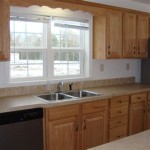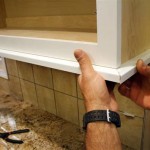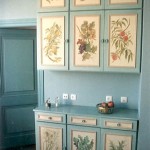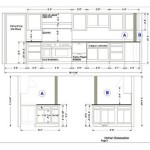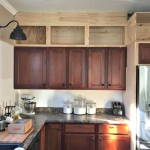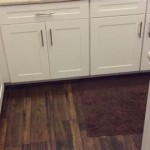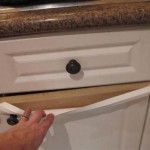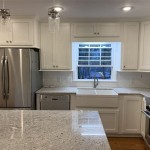Disadvantages of Aluminum Kitchen Cabinets
Aluminum kitchen cabinets have gained popularity in recent years due to their sleek appearance, durability, and resistance to certain environmental factors. However, despite these advantages, there are several disadvantages associated with using aluminum for kitchen cabinetry that potential buyers should consider before making a decision. This article will explore these drawbacks in detail, covering aspects such as cost, appearance, maintenance, and potential environmental impact.
Cost Considerations
One of the primary disadvantages of aluminum kitchen cabinets is their cost. Compared to more traditional materials like wood or laminate, aluminum is typically more expensive. The higher price is attributed to the cost of raw materials, the specialized manufacturing processes required to work with aluminum, and the potential for custom designs and finishes that further increase the overall expense.
The initial investment for aluminum cabinets can be significantly higher, potentially straining the budget for a kitchen renovation project. Homeowners need to factor in not only the cost of the cabinets themselves but also the cost of installation, which may require specialized tools and expertise. This can lead to a higher overall project cost compared to choosing alternative materials.
While aluminum is durable and long-lasting, the higher upfront cost may not be justifiable for all homeowners, especially those with budget constraints. When evaluating the long-term value, it's important to compare the cost of aluminum cabinets with other materials and consider the potential maintenance and replacement costs associated with each option. In some cases, a less expensive material with proper maintenance may offer a more cost-effective solution over the lifespan of the kitchen.
Aesthetic Limitations and Design Constraints
While aluminum cabinets can offer a modern and minimalist aesthetic, they also present certain design limitations. The appearance of aluminum can be perceived as sterile or industrial, which may not align with the desired aesthetic for all homeowners. The cool, metallic look can lack the warmth and natural character that wood cabinets provide.
Aluminum cabinets often come in a limited range of colors and finishes compared to wood or laminate. While powder coating can provide a variety of color options, the available textures and patterns are often more restricted. This can limit the design possibilities and make it challenging to achieve a specific look or match existing décor.
The smooth, flat surfaces of aluminum cabinets can also be prone to showing fingerprints and smudges, requiring more frequent cleaning to maintain a pristine appearance. Moreover, the design intricacies that can be achieved with wood, such as intricate carvings or raised panels, are difficult or impossible to replicate with aluminum. This can limit the overall design flexibility and customization options available to homeowners.
Furthermore, integrating aluminum cabinets with traditional design elements can be challenging. The modern aesthetic may clash with more classic or rustic styles, requiring careful consideration and planning to ensure a cohesive and harmonious design. Homeowners who prefer a more traditional or eclectic look may find aluminum cabinets too limiting for their needs.
Maintenance Challenges and Susceptibility to Damage
Despite its durability, aluminum is not entirely immune to damage and requires specific maintenance to keep it in optimal condition. While aluminum is resistant to rust and corrosion, it can still be susceptible to scratches and dents, especially in high-traffic areas of the kitchen. These imperfections can be difficult to repair and may detract from the overall appearance of the cabinets.
The smooth surfaces of aluminum cabinets can also be prone to showing fingerprints, smudges, and watermarks, requiring frequent cleaning to maintain a clean and polished look. Special cleaning products may be required to avoid damaging the finish or leaving streaks. This can be time-consuming and may add to the overall maintenance burden.
While aluminum is fire-resistant, it is also a good conductor of heat. This means that aluminum cabinets can become hot to the touch when exposed to direct sunlight or heat from cooking appliances. This can be a safety concern, especially for households with young children or pets.
In coastal areas or regions with high humidity, aluminum cabinets can be susceptible to galvanic corrosion if they come into contact with dissimilar metals. This can cause the aluminum to deteriorate over time, leading to structural damage and compromising the integrity of the cabinets. Proper installation and maintenance are crucial to prevent galvanic corrosion and extend the lifespan of aluminum cabinets in these environments.
Sound Transmission and Resonance
Aluminum is a naturally resonant material, which means it can amplify sounds and vibrations. This can be a significant disadvantage in a kitchen environment, where noise levels are often already high due to appliances, cooking activities, and general conversation. The hollow construction of many aluminum cabinets can further exacerbate this issue, creating a noisy and unpleasant atmosphere.
The sound of closing aluminum cabinet doors can be particularly loud and jarring, especially in quiet households or apartments. This can be disruptive and annoying over time, especially if the cabinets are frequently used. Similarly, the vibration of appliances, such as dishwashers or refrigerators, can be amplified by aluminum cabinets, creating a constant hum or buzz that can be distracting.
While sound-dampening materials can be used to mitigate the noise transmission of aluminum cabinets, this adds to the overall cost and complexity of the installation. Furthermore, these materials may not be entirely effective in eliminating the noise, especially in larger kitchens or homes with open floor plans. Homeowners sensitive to noise may want to consider other materials that offer better sound insulation.
Environmental Considerations
While aluminum is often touted as a recyclable material, the production of new aluminum is an energy-intensive process that can have significant environmental impacts. The extraction of bauxite ore, the primary source of aluminum, can lead to deforestation, soil erosion, and water pollution. The refining process also requires large amounts of electricity, often generated from fossil fuels, contributing to greenhouse gas emissions.
While recycling aluminum can reduce the environmental impact compared to producing new aluminum, the recycling process itself still requires energy and resources. Furthermore, not all aluminum products are easily recyclable, and some may end up in landfills. The lifespan of aluminum cabinets also plays a role in their overall environmental footprint. If the cabinets are replaced frequently, the environmental impact associated with their production and disposal will be higher.
Homeowners concerned about the environmental impact of their kitchen renovation may want to consider other materials that are more sustainable, such as reclaimed wood or bamboo. These materials have a lower carbon footprint and are often sourced from renewable resources. When choosing aluminum cabinets, it's important to consider the sourcing and manufacturing practices of the supplier to ensure they are committed to minimizing their environmental impact.
Potential for Dents and Scratches
Although aluminum is considered a durable material, it is susceptible to dents and scratches. In a busy kitchen environment where there's constant activity, the risk of accidental impacts and abrasions is relatively high. Dropping heavy objects, bumping into cabinets with appliances, or even just everyday use can lead to unsightly dents and scratches on aluminum surfaces.
Unlike wood, which can often be repaired or refinished to hide imperfections, dents and scratches on aluminum are more challenging to fix. Repairing these blemishes may require specialized tools and techniques, and the results may not always be seamless. In some cases, the only option may be to replace the damaged cabinet panel, which can be costly and inconvenient.
The visibility of dents and scratches on aluminum depends on the finish of the cabinets. Polished or glossy finishes tend to show imperfections more readily than matte or textured finishes. Choosing a finish that is more resistant to scratches and dents can help minimize the appearance of damage, but it won't eliminate the risk entirely. Homeowners with young children or pets may want to consider other materials that are more resistant to damage.
Thermal Expansion and Contraction
Aluminum experiences a significant amount of thermal expansion and contraction in response to temperature changes. In a kitchen environment where temperatures can fluctuate due to cooking activities, the expansion and contraction of aluminum cabinets can lead to problems such as warping, buckling, and loosening of joints.
The expansion and contraction of aluminum can also cause the finish to crack or peel, especially if the cabinets are exposed to extreme temperature variations. This can compromise the appearance and durability of the cabinets, requiring costly repairs or replacements. Proper installation techniques and the use of expansion joints can help mitigate these problems, but they won't eliminate them entirely.
In regions with extreme climates, the thermal expansion and contraction of aluminum cabinets can be particularly problematic. The constant stress on the cabinets can accelerate wear and tear, shortening their lifespan and increasing the need for maintenance and repairs. Homeowners in these areas may want to consider other materials that are less sensitive to temperature changes.

Aluminum Kitchen Cabinet Pros Cons A Star Furnishing

Aluminum Kitchen Cabinet 5 Advantages And Disadvantages

Aluminum Kitchen Cabinet 5 Advantages And Disadvantages

Aluminum Kitchen Cabinet Pros Cons A Star Furnishing

Aluminium Kitchen Cabinet What You Should Know How Why

Aluminium Kitchen Cabinet What You Should Know How Why

Aluminium Kitchen Cabinets Pros Cons And More Recommend My

Aluminium Kitchen Cabinets Pros Cons And More Recommend My

Aluminium Kitchen Cabinet What You Should Know How Why

5 Pros Cons Of Aluminium Kitchen Cabinet
Related Posts

